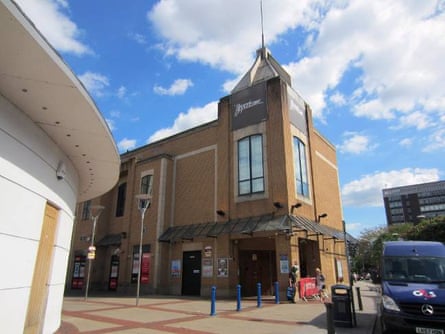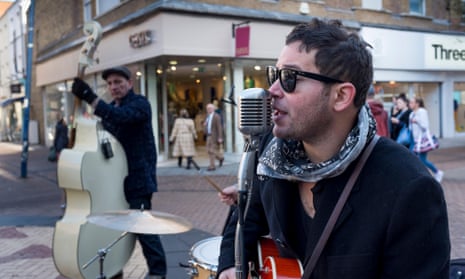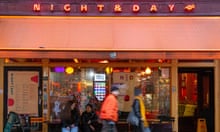Just months after a visit from the Mayor of London’s night tsar, appointed to protect and promote nightlife in the capital, the largest live music venue in the south-east borough of Kingston upon Thames is now at risk of closure.
There’s no formal planning application to redevelop the 1,000-capacity Hippodrome yet, a Kingston mainstay for over 20 years that has acted as a springboard to major guitar bands and pop acts alike, from Suede to Ed Sheeran. But Kevin Davis, leader of the borough’s council, has told the Guardian he expects a planning application for mixed residential and retail use to be submitted before the end of the year.
The venue’s staff were shocked and upset when informed, says longtime Hippodrome employee Oscar Zammit. “Its sad to think Kingston may lose such an important part of its culture,” he says. “It’s a real coming-of-age site for some of our younger visitors.” The three-room venue has recently hosted London Grammar and Tinie Tempah, with Dizzee Rascal and the Vamps lined up for this week. “Maybe some people just see it as a stinky old nightclub,” says Zammit, “but it’s more than that.”

Home Farms Trust, a charity for adults with learning disabilities, regularly uses the venue as a meeting place and club; an annual Easter drive sees revellers turning up with treats, which the venue matches and donates to children at Kingston hospital; and for two years, Kingston College used the building as a workspace for students while their Richmond Road site was under construction. “I see some of those very same students returning for live events at the club now,” says Zammit. Developers, however, see the Surrey House site as prime real estate.
“I don’t want to see the Hippodrome go,” says Banquet Records’ Jon Tolley, who promotes gigs at the venue. He is also a local Lib Dem councillor who has set up a petition protesting the plans – but the site belongs to a landowner rather than the council. “I accept that it probably will close,” says Tolley. “And when it does, what then?”
Kingston’s live music scene isn’t just culturally valuable, it’s profitable too. Footfall data from business improvement body KingstonFirst shows consistent spikes around every New Slang show – a regular club night at the Hippodrome. As Tolley points out: “Some people will go to the hairdressers before; some will go to a kebab shop after; some will get a cab home.” Why, then, is the council not safeguarding its home-grown scene?
Tolley believes the cuts to local councils made by central government are forcing the former to generate much-needed funds via council tax. “More flats equal more council tax.”
Some argue that the borough has a history of prioritising the town’s heritage over its nightlife, pointing to the £4m the council recently allocated to move a Kings and Saxons exhibition from the museum to a new build at All Saints Church, another Banquet affiliate venue.
“I worry the council decision-makers view ‘our culture’ as inferior to ‘their culture’,” says Tolley. Figures released by the Music Venue Trust this week certainly appear to back this up, revealing how highbrow arts – opera and classical – receive the lion’s share of funding, while indie and DIY initiatives languish.

“The council contributes towards [local theatre and recent Banquet venue] the Rose,” points out Tolley. “And it supports other admirable events like Kingston’s international youth arts festival. Yet the Kingston venue that regularly houses the biggest music artists in the UK receives no such public money – and is, despite this, profitable.”
With the Peel folding in 2014, and the Viper Rooms (previously McClusky’s) set to close in 2019, Kingston, like so many UK boroughs, has a venue problem. “We’ve been offered some amazing, A-grade artists to play the Rose in recent times,” reports Tolley. But even Glastonbury headliner-level acts have no power over long-stint theatre schedules.
Tolley believes the council is ignorant of, rather than hostile to, the town’s flourishing music culture. “If they are knowingly closing the town’s only venue that regularly houses some of the best events the borough sees, and fail to suggest an alternative, they are doing irreparable damage to the town.”
When approached for comment yesterday, the council told the Guardian that it was “supporting the current creation of a new large-scale auditorium which could be used for music, dance, theatre and a range of other cultural events once completed”. It is the first Tolley – who talked with Davis after presenting the petition to him at a full-council meeting on Tuesday – has heard of it. The council were asked by the Guardian to elaborate on their plans, but have not yet responded.
How long this commitment will take to materialise – if at all – and whether the people who have built Kingston’s music scene from scratch will have a seat at the planning table, remains to be seen.










Comments (…)
Sign in or create your Guardian account to join the discussion